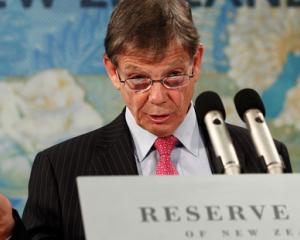The Reserve Bank is widely expected to leave official interest rates unchanged at 2.5% on Thursday, despite some encouraging signs emerging in the New Zealand economy.
The recent surge in the New Zealand dollar in recent months has attracted a lot of attention.
With the currency reaching post-float record highs against the US dollar, there has been increasing speculation the Reserve Bank may intervene in the foreign exchange markets.
ASB economists believe that is highly unlikely, given the appreciation has been backed up by very strong commodity prices.
The central bank will continue to highlight the uncertainty that remains over the outlook for the economy and Thursday will be the first time the Reserve Bank releases a full set of forecasts since the February earthquake.
Recent data suggests tentative signs of an increase in underlying economic activity, with business confidence rebounding back to pre-earthquake levels.
Inflation pressures have also begun to creep up.
However, ASB chief economist Nick Tuffley said a large degree of uncertainty remained over the growth outlook, particularly in regards to the effects of the earthquakes.
"Preparations for rebuilding have yet to begin in any meaningful way with aftershocks still occurring and the risk of another major earthquake still present."
The ASB expected the Reserve Bank to leave the official cash rate (OCR) at current low settings until March 2012.
By then the bank should get a clearer picture of the extent of the rebuilding likely to take place and the underlying economic recovery would have had a chance to gather momentum, he said.
There were tentative signs of a turnaround in the economy.
Business confidence had recovered strongly, driven by an improvement in profitability expectations.
"Businesses have become more confident about putting in place expansion plans, as reflected in investment and hiring intentions," Mr Tuffley said.
Housing market activity, particularly in Auckland, was starting to improve.
That reduced one of the headwinds to the household sector and was likely to support a recovery in consumer confidence in coming months.
Electronic card transactions had grown strongly in March and April, he said.
In particular, the lift in core spending was an encouraging development given the higher prices of food and fuel.
Electronic card transactions were not Mr Tuffley's preferred measure of spending but it was the only one available since Statistics New Zealand discontinued the monthly retail trade survey.
"Tourism may not be as adversely affected by the Canterbury earthquake as initially thought, following a strong bounce back in arrival numbers in April."
Employment - excluding the Canterbury region - increased strongly in the March quarter, he said.
While those were encouraging signs, they still paled in comparison to the scale of economic disruption as a result of the February 22 earthquake in Christchurch.
Employment was likely to fall in the second quarter, reflecting job losses in the region.
"Given part of the improvement in retail spending is likely to be due to Christchurch households replacing damaged appliances, the sustainability of the improvement in spending remains to be seen," he said.





